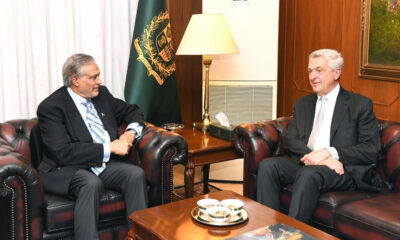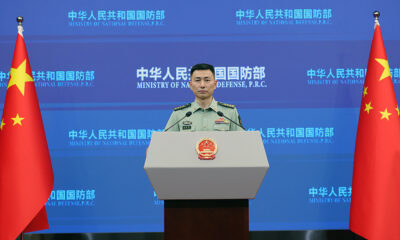Regional
Early Pakistan vote results show rivals neck and neck
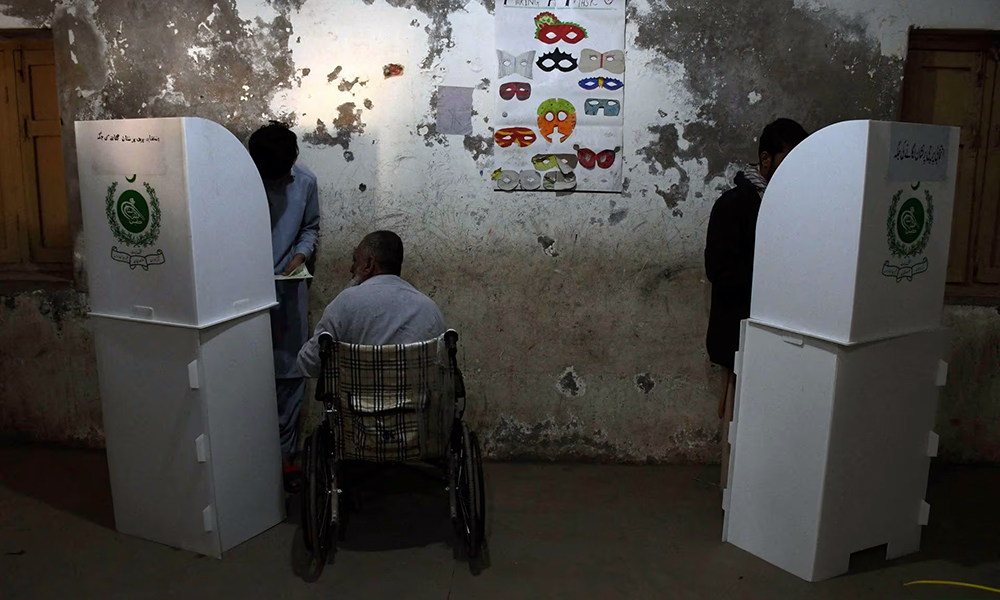
Pakistan’s main political parties were tied neck and neck in early results on Friday after vote counts in the general election were hit by unusual delays that the government blamed on a suspension of mobile phone services, Reuters reported.
The South Asian country is struggling to recover from an economic crisis while it grapples with rising militant violence in a deeply polarised political environment.
An “internet issue” was the reason behind the delay in results, Zafar Iqbal, special secretary at the Election Commission of Pakistan (ECP), said without elaborating.
The government said it suspended mobile phone services ahead of the election on Thursday as a security measure, and they were being partially resumed, read the report.
By early Friday morning, the ECP had announced results for 12 of the 265 contested seats in parliament on its website.
Five were taken by supporters of jailed cricket star Imran Khan who were contesting as independents while four were won by the Pakistan Muslim League (Nawaz) (PML-N), the party of former prime minister Nawaz Sharif.
According to Reuters three seats were taken by the Pakistan Peoples Party of Bilawal Bhutto Zardari, the son of assassinated premier Benazir Bhutto.
The main battle is expected to be between candidates backed by Khan, whose Tehreek-e-Insaf (PTI) party won the last national election, and the PML-N of Sharif, who analysts say is being backed by the powerful military.
With counting continuing into Friday morning, a clear picture was likely to emerge only later in the day.
A party needs 133 seats in parliament for a simple majority but many analysts believe the vote may not produce a clear winner.
Sharif, considered by many observers to be a strong candidate, dismissed talk of an unclear result.
“Don’t talk about a coalition government. It is very important for a government to get a clear majority… It should not be relying on others,” he told reporters after casting his vote in the eastern city of Lahore.
Thousands of troops were deployed on the streets and at polling stations across the country on Thursday. Borders with Iran and Afghanistan were temporarily closed as security was stepped up to ensure peaceful polling, Reuters reported.
Despite the heightened security, 12 people, including two children, were killed in 51 bomb blasts, grenade attacks and shootings by militants, mostly in the western provinces, the military said in a statement.
The victims included five police killed in a bomb blast and firing on a patrol in the Kulachi area of Dera Ismail Khan district in the northwest, authorities said. Two children died in a blast outside a women’s polling station in Balochistan province.
“Despite a few isolated incidents, the overall situation remained under control, demonstrating the effectiveness of our security measures,” caretaker Interior Minister Gohar Ejaz said in a statement.
Washington was concerned about “steps that were taken to restrict freedom of expression, specifically around internet and cellphone use,” State Department deputy spokesperson Vedant Patel told reporters.
The U.S. strongly condemned election-related violence both in the run-up to the polls and on election day, Patel added.
United Nations Secretary-General Antonio Guterres also expressed concern about the violence and the suspension of mobile communications services, his spokesperson said in an e-mailed statement, Reuters reported.
Amnesty International called the suspension of mobile services “a blunt attack on the rights to freedom of expression and peaceful assembly”.
Chief Election Commissioner Sikandar Sultan Raja said the decision on mobile networks was made by “law and order agencies” following violence on Wednesday in which 26 people were killed.
The military has dominated the nuclear-armed country either directly or indirectly in its 76 years of independence but for several years it has maintained it does not interfere in politics.
“The deciding factor is which side the powerful military and its security agencies are on,” said Abbas Nasir, a columnist, commenting on the likelihood that no party would emerge as a clear winner. “Only a huge turnout in favour of (Khan’s) PTI can change its fortunes.”
He added: “Economic challenges are so serious, grave, and the solutions so very painful that I am unsure how anyone who comes to power will steady the ship.”
If the election does not result in a clear majority for anyone, as analysts are predicting, tackling multiple challenges will be tricky – foremost being seeking a new bailout programme from the International Monetary Fund (IMF) after the current arrangement expires in March.
Regional
China braces for twin tropical cyclones after deadly flash floods
In the northwestern province of Shaanxi, a highway bridge collapsed on Friday amid torrential rain, killing at least 12, with 31 people and 18 vehicles still missing.
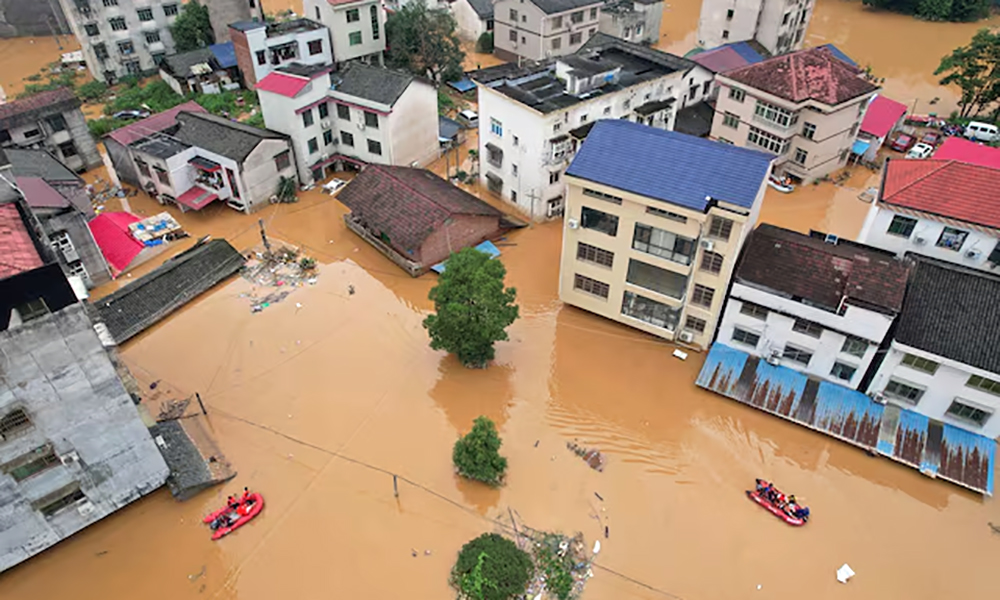
Two tropical cyclones will bring gales and heavy rain to China’s eastern seaboard this week, with the first expected to make landfall on Sunday, after deadly flash floods struck the country’s interior over the weekend.
Cyclone Prapiroon is expected to make landfall in China’s southernmost island province of Hainan on Sunday night as a strong tropical storm, the first tropical cyclone to hit China this year, national forecasters said.
Formed in the South China Sea, Prapiroon’s centre was about 275 km southeast of the Hainan city of Wanning early Monday, Reuters reported.
The maximum wind speed near its centre will be up to 110 kph when Prapiroon lands, the National Meteorological Centre said, predicting torrential rains in Hainan and along the coast of Guangdong, China’s most populous province.
Later this week, Gaemi, which was about 530 km northeast of Philippine capital Manila on Sunday morning, is expected to brush past the northern tip of Taiwan, then make landfall in China as a typhoon, packing wind speeds of up to 180 kph, according to Chinese forecasters.
Taiwan’s Central Weather Administration said it expected Gaemi to be closest to the island on Wednesday and Thursday, bringing heavy rain.
Extreme rainfall has hit China’s southern, central and eastern parts in a flood season that started earlier than usual this year. Record rainfall pounded southern China in April to June, while in the north, dry weather parched fields and threatened crops.
In the northwestern province of Shaanxi, a highway bridge collapsed on Friday amid torrential rain, killing at least 12, with 31 people and 18 vehicles still missing.
In Sichuan province in the southwest, rescuers had retrieved eight bodies and pulled four people to safety by 8 p.m. on Saturday, after more than 30 went missing amid flash floods.
Regional
China’s Xi urges all-out rescue efforts after highway bridge collapse kills 11
As of 10 a.m. on Saturday, five vehicles were confirmed to have fallen into the water and 30 people were reported missing, state media said.

President Xi Jinping urged all-out rescue efforts after a highway bridge collapse on Friday in Shaanxi province in China’s northwest killed 11 people, state media reported on Saturday.
The incident occurred at 8:40 p.m. (1240 GMT) in Shangluo city on Friday when a highway bridge collapsed due to a flash flood, causing some vehicles to fall into the river.
As of 10 a.m. on Saturday, five vehicles were confirmed to have fallen into the water and 30 people were reported missing, state media said, Reuters reported.
Xi said China is in a critical period for flood control and local governments must take responsibility to enhance monitoring and early warning.
China’s national fire and rescue authority said on Saturday it had dispatched a rescue team to the site that included 859 people, 90 vehicles, 20 boats and 41 drones.
Regional
Widespread telecoms disruptions in Bangladesh as student protests spike
Thursday’s violence in 47 of Bangladesh’s 64 districts killed 27 and injured 1,500, it added, while French news agency AFP put the day’s toll at 32, citing a police spokesman as saying 100 policemen were injured with 50 police booths burnt.
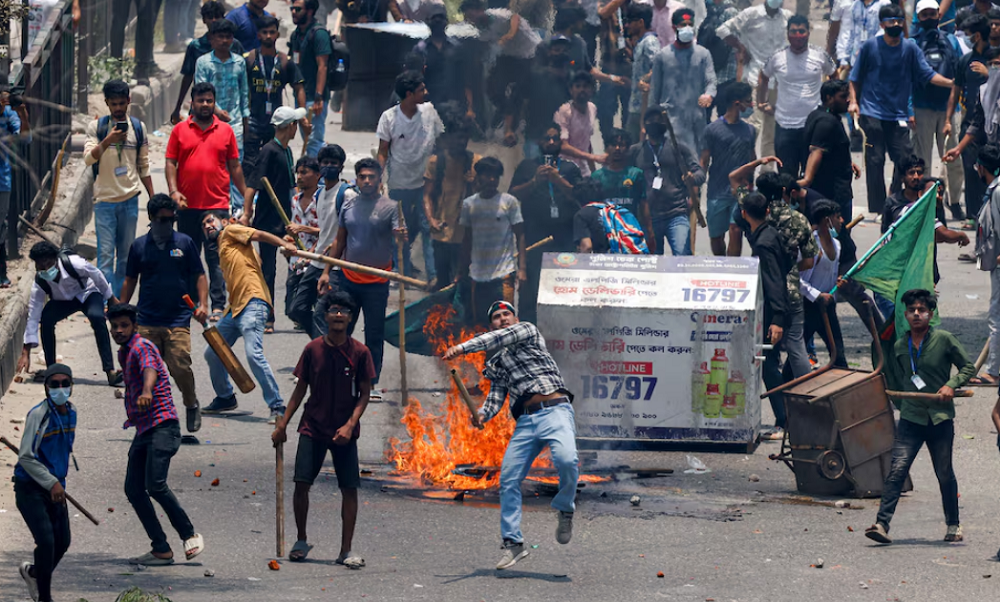
Telecoms links were widely disrupted in Bangladesh on Friday, with television news channels going off the air amid violent student protests against quotas for government jobs that have killed nearly two dozen people this week.
Sparked by student anger against the controversial quotas, the protests, some analysts say, are also being fuelled by economic woes, such as high inflation, growing unemployment and shrinking reserves of foreign exchange, Reuters reported.
The government offered no immediate comment on Friday’s severed communications, but said police in Dhaka, the capital, had barred all public meetings and processions indefinitely.
Police fired tear gas to scatter protesters in some zones of fresh violence, Reuters journalists said, adding that security forces and protesters milled about in the streets of Dhaka.
Protesters blocked roads at many places and threw bricks at security forces, the English-language website of the Bengali newspaper Prothom Alo said.
Thursday’s violence in 47 of Bangladesh’s 64 districts killed 27 and injured 1,500, it added, while French news agency AFP put the day’s toll at 32, citing a police spokesman as saying 100 policemen were injured with 50 police booths burnt.
Reuters, which reported 13 dead, up from a tally of six earlier in the week, could not immediately verify the higher figures.
Citing unidentified sources, India’s Economic Times newspaper said Prime Minister Sheikh Hasina’s government was forced to call in the army late on Thursday to help maintain order.
Reuters could not independently verify the details.
The protests have also opened old and sensitive political faultlines between those who fought for Bangladesh’s independence from Pakistan in 1971 and those accused of collaborating with Islamabad.
The former include the Awami League ruling party of Hasina, who branded the protesters “razakar”, making use of a term that described independence-era collaborators.
Authorities had cut some mobile services on Thursday to try to quell the unrest, but the disruption widened nationwide the next morning, Reuters witnesses said.
Overseas telephone calls and those through the internet were crippled, while the websites of several Bangladesh newspapers did not update on Friday and were also inactive on social media.
A few voice calls went through, but there ws no mobile data or broadband, a Reuters photographer in Dhaka said, adding that even text messages were not being transmitted.
News television channels and state broadcaster BTV went off the air, although entertainment channels were normal, a Reuters witness said.
Some news channels displayed a message blaming technical issues, and promising to resume programming soon, the witness said.
Streets in Dhaka were deserted with little traffic on Friday, a weekly holiday in the Muslim-majority nation, but the witness added that a protest rally had been called for 0800 GMT at the main mosque.
There were no flight disruptions at the main international airport, aviation website Flightradar24 showed.
WEBSITES HACKED
The official websites of the central bank, the prime minister’s office and police appeared to have been hacked by a group calling itself “THE R3SISTANC3”.
“Operation HuntDown, Stop Killing Students,” read identical messages splashed on the sites, adding in crimson letters: “It’s not a protest anymore, it’s a war now.”
Another message on the page read, “Prepare yourselves. The fight for justice has begun,” adding, “The government has shut down the internet to silence us and hide their actions. We need to stay informed about what is happening on the ground.” Giant neighbour India once again urged its citizens in Bangladesh to avoid local travel and limit movement.
The nationwide agitation, the biggest since Hasina was re-elected this year, has been fuelled by high unemployment among the youth, most of them out of education or work, who make up nearly a fifth of a population of 170 million.
Protesters want the government to stop setting aside 30% of government jobs for the families of those who fought for independence from Pakistan.
Bangladesh’s Supreme Court, which has set an Aug.7 date to hear an appeal by Hasina’s government against a high court order last month to reinstate the quota system scrapped in 2018, has suspended the lower court’s order until the hearing.
On Thursday, the government said it was willing to hold talks with the protesters, but they refused, saying, “Discussions and opening fire do not go hand in hand.”
Dhaka’s main university campus had been the site of the worst protests, but Thursday saw bigger demonstrations elsewhere.
Reeling from the ripple effects of the Russia-Ukraine war, Bangladesh got a $4.7-billion bailout from the International Monetary Fund in January 2023.
In June it got immediate access to IMF loans of about $928 million for economic support and about $220 million to fight climate change.
-

 Sport4 days ago
Sport4 days agoOlympics finally here; What you need to know
-

 Latest News5 days ago
Latest News5 days agoOCHA reports 110 die in landmine explosions in Afghanistan every month
-

 World5 days ago
World5 days agoBiden ends failing reelection campaign, backs Harris as nominee
-

 Regional5 days ago
Regional5 days agoChina braces for twin tropical cyclones after deadly flash floods
-

 Health4 days ago
Health4 days agoHealth partners provide services 589,205 people in Afghanistan in last month
-

 Latest News3 days ago
Latest News3 days agoAfghanistan’s Hajj ministry confirms death of 27 pilgrims in Mecca and Medina
-

 Business4 days ago
Business4 days agoConference on Islamic microfinance kicks off in Kabul
-

 Sport4 days ago
Sport4 days agoACB proposes ODI fixtures against top-tiered teams










